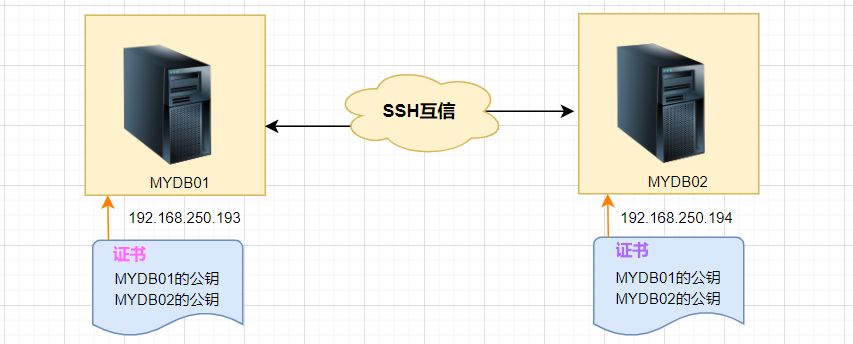
1. Lors de la création d'un cluster, vous avez besoin d'une SSHConfiance mutuelle, propice à un fonctionnement pratique sur un autre nœud.
2. Lorsque vous utilisez scp远程拷贝操作时,需要输入目标服务器的用户名和密码,这个时候可以做linux服务器之间ssh互信配置, 这样在多个linuxpour effectuer des opérations entre serveurs, vous pouvez vous connecter sans mot de passe.
En bref, le serveur stocke le certificat de l'hôte cible afin que l'authentification se fasse automatiquement sans avoir besoin de saisir de mot de passe.

1. Chaque nœud génère sa propre paire de clés publique et privée.
2. Envoyez votre fichier de clé publique à l'autre partie.
3. Vérifiez si la configuration de la confiance mutuelle est réussie.
Voici le MYDB01和MYDB02两台LINUXhost à titre d'exemple :
Générez respectivement sur deux hôtes, appuyez directement sur Entrée lorsque vous êtes invité à saisir les informations :
# MYDB01Hôte :
[root@MYDB01 ~]# ssh-keygen -t rsa Generating public/private rsa key pair. Enter file in which to save the key (/root/.ssh/id_rsa): Enter passphrase (empty for no passphrase): Enter same passphrase again: Your identification has been saved in /root/.ssh/id_rsa. Your public key has been saved in /root/.ssh/id_rsa.pub. The key fingerprint is: SHA256:lQex2+SbdmGGNBvU8vjaTKVCbfAmk8Eva+C6BPJ49G0 root@MYDB01 The key's randomart image is: +---[RSA 2048]----+ |oo.. | | == .| |+ *@ | | ..BB=B .| |. o S..o=O+o | | = o .. +=+. | |. o o.E.+*.| | . ... ...o| |.. | +----[SHA256]-----+ [root@MYDB01 ~]#
# MYDB02Hôte :
[root@MYDB02 ~]# ssh-keygen -t rsa Generating public/private rsa key pair. Enter file in which to save the key (/root/.ssh/id_rsa): Created directory '/root/.ssh'. Enter passphrase (empty for no passphrase): Enter same passphrase again: Your identification has been saved in /root/.ssh/id_rsa. Your public key has been saved in /root/.ssh/id_rsa.pub. The key fingerprint is: SHA256:8DGfMHFZDrEOOYhcpFGXI8tndQXTE4FampR6cTowAo4 root@MYDB02 The key's randomart image is: +---[RSA 2048]----+ |o++ o.+=+=+o | | + =oo=+*+=.o| |E =.o+OB.X.. | |oo+XB. | | oS.+. | | | | | | | | | +----[SHA256]-----+ [root@MYDB02 ~]#
De cette façon, la clé publique et la clé secrète sont créées, et **id_rsa和id_rsa.pub** deux fichiers seront générés.
Générationssh密钥后,密钥将默认存储在家目录下的**.ssh/目录**.
Les autorisations de la clé privée et de la clé publique sont respectivement **600和644**.
Les autorisations du répertoire .ssh doivent être de 700
Options :
-t rsa|dsa默认是rsaFormat.
Ensuite, vous pouvez visualiser les fichiers de clé publique et de clé privée générés :
[root@MYDB01 ~]# cd /root/.ssh [root@MYDB01 .ssh]# pwd /root/.ssh [root@MYDB01 .ssh]# ll -sh 总用量 12K 4.0K -rw-------1 root root 1.7K 2月14 16:17 id_rsa 4.0K -rw-r--r--1 root root393 2月14 16:17 id_rsa.pub [root@MYDB01 .ssh]#
#Format de commande :
ssh-copy-id [-i [identity_file]] [user@]machine
La fonction de cette commande est de supprimer les autorisations id_rsa.pub文件内容传输至对方的 .ssh目录中,生成文件名为authorized_keys 文件,并且会设置远程主机用户目录的**.ssh和.ssh/authorized_keys**.
# Faites ce qui suit sur MYDB01 :
[root@MYDB01 .ssh]# ssh-copy-id 192.168.250.194 /usr/bin/ssh-copy-id: INFO: Source of key(s) to be installed: "/root/.ssh/id_rsa.pub" /usr/bin/ssh-copy-id: INFO: attempting to log in with the new key(s), to filter out any that are already installed /usr/bin/ssh-copy-id: INFO: 1 key(s) remain to be installed -- if you are prompted now it is to install the new keys root@192.168.250.194's password: Number of key(s) added: 1 Now try logging into the machine, with: "ssh '192.168.250.194'" and check to make sure that only the key(s) you wanted were added. [root@MYDB01 .ssh]#
Voir ici sur MYDB02host :
[root@MYDB02 ~]# cd /root/.ssh [root@MYDB02 .ssh]# ll 总用量 12 -rw------- 1 root root393 2月14 16:41 authorized_keys -rw------- 1 root root 1679 2月14 16:20 id_rsa -rw-r--r-- 1 root root393 2月14 16:20 id_rsa.pub [root@MYDB02 .ssh]# cat authorized_keys ssh-rsa AAAAB3NzaC1yc2EAAAADAQABAAABAQCtQ+pBp1T9fHAkrifEShaOAfBJFT+HdljR8mBxl7wZ1a91g3Zuzu35gJKsUjD+NqP9JcdyKapE309SHPvosvsJjLfccF4PaEZAgqHryu+S3cBn8zqA6fm62hsx/qI4I80PV0btcqfwphsD+5+vgkDJWAsUGQtqZdmMClAIy5gs0He0K2jpciKHvxWWClB3+dTJ0e9yIuIkV7lM+jqVIqYFJD0bRyy0zgNsY5/cLYFllM42TQDos93hVdqGXOHREpWo01KX2Jd8MKj4yNeiqgnj2mDtiNFWOUSkAbHpcKInuUOErJMqkV7MP0er5UKY/NemDzuORr2RxYqSTWaz/T7N root@MYDB01 [root@MYDB02 .ssh]#
L'opération ci-dessus n'est qu'une confiance unilatérale. L'hôte MYDB01登录主机MYDB02se connecte à l'hôte
MYDB02上将其钥复制到主机MYDB01# Copiez sa clé sur l'hébergeur
[root@MYDB02 .ssh]# ssh-copy-id 192.168.250.193 /usr/bin/ssh-copy-id: INFO: Source of key(s) to be installed: "/root/.ssh/id_rsa.pub" The authenticity of host '192.168.250.193 (192.168.250.193)' can't be established. ECDSA key fingerprint is SHA256:vThEoRhUOECeD5jhE+m8TZA2+6OoElIoNOQ3XqtopZw. ECDSA key fingerprint is MD5:97:40:b2:35:6e:07:5a:61:1f:73:f1:b2:6e:54:5b:7d. Are you sure you want to continue connecting (yes/no)? y Please type 'yes' or 'no': yes /usr/bin/ssh-copy-id: INFO: attempting to log in with the new key(s), to filter out any that are already installed /usr/bin/ssh-copy-id: INFO: 1 key(s) remain to be installed -- if you are prompted now it is to install the new keys root@192.168.250.193's password: Number of key(s) added: 1 Now try logging into the machine, with: "ssh '192.168.250.193'" and check to make sure that only the key(s) you wanted were added. [root@MYDB02 .ssh]#
4.3 Vérifier la confiance mutuelleMYDB01主机和MYDB02主机上通过SSH
sur l'hôte MYDB01主机上登录MYDB02 et l'hôte
Connectez-vous sur
hôte MYDB02主机上登录MYDB01Hôte :
[root@MYDB01 .ssh]# ssh 192.168.250.194 Last login: Tue Jan 9 15:41:56 2023 from 192.168.250.193 [root@MYDB02 ~]#
[root@MYDB02 .ssh]# ssh 192.168.250.193 Last failed login: Tue Feb 14 16:48:54 CST 2023 from 192.168.250.194 on ssh:notty There was 1 failed login attempt since the last successful login. Last login: Tue Jan 9 15:41:34 2024 from 192.168.250.194 [root@MYDB01 ~]#
Ce qui précède est le contenu détaillé de. pour plus d'informations, suivez d'autres articles connexes sur le site Web de PHP en chinois!